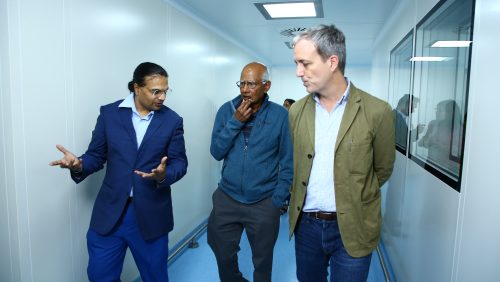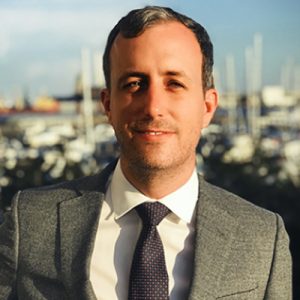
Brian Wahl Faculty Spotlight
 “COVID-19 highlighted the need for multidisciplinary and interprofessional approaches to public health.”
“COVID-19 highlighted the need for multidisciplinary and interprofessional approaches to public health.”
Dr. Brian Wahl, Associate Research Professor, International Health, sees capacity strengthening as one of the most important elements for developing positive downstream effects in healthcare in India. In Uttar Pradesh, where most of his work is done, many people who are responsible for creating public health programs and executing public health functions have had limited formal training in public health, he notes.
“These are medical officers trained in medicine, but then tasked with executing public health programs in the state. There’s a strong need for strengthening public health competencies among the existing workforce so that those core public health functions are better executed,” he said. “Recently, COVID-19 really highlighted the need for multidisciplinary and interprofessional approaches to public health and a public health and management cadre.”
“A public health and management cadre inherently takes that kind of approach to addressing public health problems,” Dr. Wahl explained. “The fact that the government has recognized that and is beginning to plan for it across multiple states is very encouraging.”
This led him to work on the Uttar Pradesh Health Systems Strengthening Project in Uttar Pradesh with multiple different institutions, including the state’s Institute of Health and Family Welfare, which is responsible for training all medical officers in Uttar Pradesh, as well as assisting the Department of Health in Uttar Pradesh with their capacity for creating more strategic human resource management efforts. His work has also expanded beyond Uttar Pradesh with a partnership with the National Institute of Health and Family Welfare, a nationally focused institution looking at public health capacity strengthening across the entire country of India.
Working with Indian Partners
Dr. Wahl notes that one of the most exciting things for him, as an infectious disease epidemiologist, has been the recognition of public health and management training with Indian partner organizations. One particular project is his work with AIIMS Gorakhpur, helping to set up a community-based research site that will provide critical research for evidence informed policies and programs.
“With this new site, AIIMS Gorakhpur will contribute to ongoing public health policy and program discussions happening at the state level and expand the sources of evidence and research in the state,” he said. “It will address some of the most pressing health challenges facing the community in eastern Uttar Pradesh.”
The Uttar Pradesh Health System Strengthening Project is supported by the Gates Foundation and is implemented largely through the University of Manitoba, which have both been working in partnership for over a decade with the state government.
“The importance of health systems strengthening has been acknowledged in India for several years.” he explained. “Hopkins was brought in to provide technical support and thought partnership to the government and other partners involved in the project.”
He explained that there is still a lot of work that needs to be done to prepare for the public health and management cadre, and it will require input many different partners, like Johns Hopkins, to support launching them across states.
Planning for the Future
Dr. Wahl notes that, because much his work is catalytic in nature, it makes it difficult to measure the tangible outcomes associated with them.
“The issues that we work on are long-term and are not going to change overnight. Impact in the areas that we’re working requires substantial time and sustained effort and resources,” he explained. “Making that shift to long- term engagement, in contrast to firefighting mode, which is how a lot of public health departments everywhere in the world work, is a major challenge.”
“I think now that we have seen some of the institutional capacity strengthening training beginning to gain traction, our partners, both nationally and at the state level, continue to see it as a priority,” he said. “That leaves me optimistic that we will continue to potentially have an impact in the longer term.”